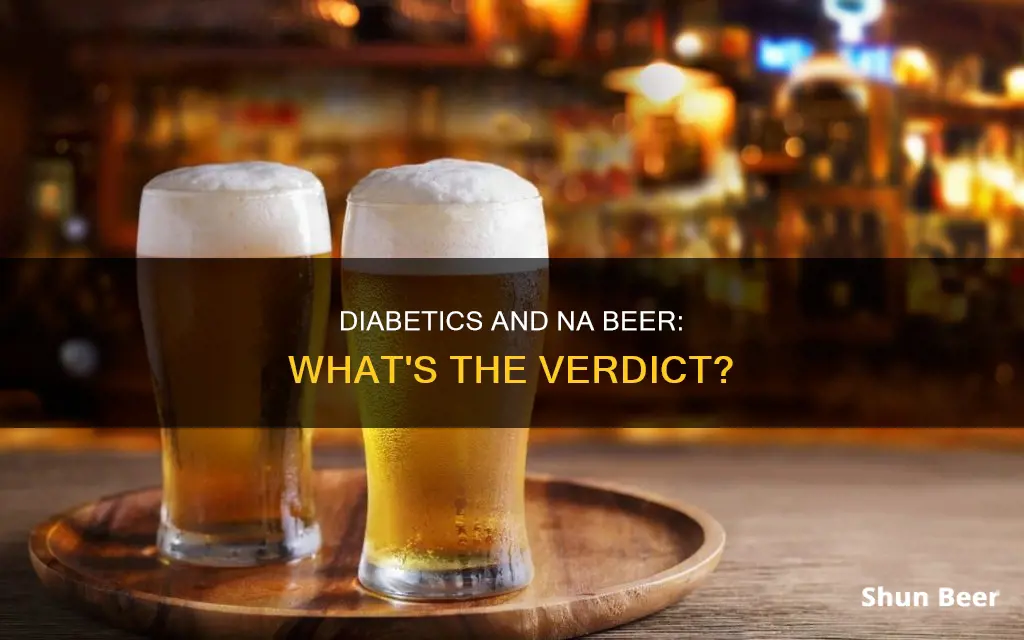
Drinking alcohol can be a tricky subject for diabetics. Alcohol can cause low or high blood sugar and interfere with diabetes medications, putting diabetics at risk of hypoglycemia. However, studies suggest that light drinking (no more than one to two drinks a day) may be beneficial for diabetics. So, can diabetics drink NA beer? NA beer, or non-alcoholic beer, is a good alternative for diabetics who want to enjoy a beer without the risks associated with alcohol. It's important to note that NA beer still contains a small amount of alcohol, so it's best to check with your doctor or healthcare provider to understand how it may affect your blood sugar levels and whether it is safe for you to consume.
Can Diabetics Drink NA Beer?
| Characteristics | Values |
|---|---|
| Is it safe for diabetics to drink NA beer? | Yes, but in moderation and with food. |
| What is the recommended amount of alcohol for women? | No more than 1 drink per day. |
| What is the recommended amount of alcohol for men? | No more than 2 drinks per day. |
| What is considered one drink of beer? | 12 fluid oz (360 ml) of regular beer (5% alcohol) |
| How does alcohol affect diabetics? | Alcohol can cause low or high blood sugar, affect diabetes medications, and lead to other complications. |
| What are the symptoms of low blood sugar? | Dizziness, loss of consciousness, slurred speech, drowsiness, confusion, difficulty walking, etc. |
| What are the risks of drinking alcohol for diabetics? | Increased risk of chronic diseases, nerve damage, dehydration, sleep problems, cancer, heart disease, etc. |
| What are some precautions diabetics can take when drinking? | Drink with food, monitor blood sugar, carry glucose tablets, avoid drinking alone, etc. |
What You'll Learn

Diabetics can drink in moderation
If you are drinking, it is important to eat food at the same time. This will help to keep your blood sugar levels normal. It is also important to drink in moderation, which is defined as one drink a day for women and up to two per day for men. One drink is defined as 12 ounces (or 360 milliliters) of beer (5% alcohol content), 5 ounces of wine (12% alcohol content), or a 1.5-ounce shot of liquor (80 proof, or 40% alcohol content).
It is also important to note that drinking alcohol can affect your diabetes medications. Alcohol can interfere with the effects of some diabetes medications, putting you at risk for low blood sugar or high blood sugar (hyperglycemia), depending on how much you drink and what medication you take. If you are taking insulin or certain types of diabetes medicine, alcohol can cause seriously low blood sugar.
To drink alcohol safely, it is important to understand how it may affect you and what steps to take to prevent problems. It is also important to speak to your doctor about your drinking habits and get their advice on how to drink in a way that works for you.
Stroke Patients and Beer: What's Safe to Drink?
You may want to see also

Non-alcoholic beer is not a healthier option
People with diabetes can still drink alcohol, including beer, but they need to be aware of how it can affect their body and how to manage this. Drinking can make it more likely for people with diabetes to experience hypoglycemia, as alcohol interferes with blood sugar levels. Alcohol can also affect weight, as alcoholic drinks can contain a lot of calories.
Secondly, non-alcoholic beer can still contain carbohydrates and calories. Beer is a significant source of carbohydrates, and depending on the type, it can be high in calories. Non-alcoholic beer may have a similar carbohydrate and calorie content to its alcoholic counterpart, which can impact blood sugar levels and contribute to weight gain.
Additionally, drinking non-alcoholic beer can trigger cravings for alcoholic drinks, especially if consumed in social settings. This can lead to increased alcohol consumption, which may have negative health effects, especially for people with diabetes.
Finally, non-alcoholic beer may not provide the same health benefits as other beverage options. For example, red wine has been found to have potential health benefits for people with diabetes, such as reduced risk of diabetic retinopathy and decreased oxidative stress, inflammation, and cardiovascular disease risk.
In conclusion, while non-alcoholic beer may seem like a healthier alternative, it is important to consider its potential impact on blood sugar levels, weight management, and overall health. People with diabetes should consume non-alcoholic beer in moderation and be mindful of its potential effects on their bodies.
Beer Distribution in Georgia: A Complex System Explained
You may want to see also

Alcohol affects blood sugar levels
Alcohol can affect blood sugar levels in people with diabetes, and it's important to understand the risks and how to drink safely. Firstly, it's worth noting that moderate drinking (one drink per day for women and up to two per day for men) may have some benefits for blood glucose management and insulin sensitivity. However, drinking excessively (more than three drinks daily) can lead to higher blood glucose levels.
When you consume alcohol, your liver prioritises clearing it from your body, which can slow down carb metabolism and potentially lead to low blood sugar (hypoglycemia). This effect is particularly significant for people with diabetes, especially if they are taking diabetes medications such as insulin or other anti-hyperglycemic drugs. Alcohol can also impair your judgment, so you may not realise that your blood sugar is low. Therefore, it is crucial to monitor your blood sugar levels regularly when drinking, especially up to 24 hours after you stop drinking.
Beer and sweet wines contain carbohydrates and can cause a rise in blood sugar levels. Alcohol also stimulates your appetite, which may lead to overeating and affect your blood sugar control. Additionally, alcoholic drinks are often high in calories, which can hinder weight loss efforts.
To minimise the risks associated with alcohol consumption, it is recommended to drink in moderation and only when your diabetes and blood sugar levels are well-controlled. Always consume alcohol with food, as this will help prevent hypoglycemia and provide better protection against low blood sugar. Avoid drinking on an empty stomach, and be mindful of the symptoms of hypoglycemia, such as slurred speech, drowsiness, confusion, or dizziness, which can be similar to the symptoms of intoxication.
It is also important to stay hydrated by drinking water along with your alcoholic beverage. Keep in mind that the standard serving size for beer is 12 ounces, and it is best to stick to low-carb and low-alcohol options. If you are taking any medications, consult your doctor to understand the potential effects of mixing alcohol with your medication.
Drinking Beer in an Uber: Is it Allowed?
You may want to see also

Alcohol can interfere with diabetes medication
When you drink alcohol, your liver has to work to remove it from your blood instead of regulating blood sugar. The liver's main function is to store glycogen, the stored form of glucose, and release it when your body needs energy. However, when you consume alcohol, your liver prioritizes breaking down and removing alcohol from your system, which can delay the release of necessary sugars into the bloodstream. This delay can last for hours after your last drink, and the more drinks you have, the higher the risk.
Therefore, it is crucial for people with diabetes to be mindful when consuming alcohol and to never drink on an empty stomach. Eating food or a carbohydrate-rich snack along with alcohol can help maintain normal blood sugar levels. It is also important to monitor blood sugar levels before, during, and after drinking, as alcohol can cause hypoglycemia. Knowing your blood sugar numbers and staying within a safe zone is essential.
Furthermore, the symptoms of low blood sugar can be similar to those of alcohol intoxication, including dizziness, loss of consciousness, and confusion. This overlap can make it challenging for people to distinguish between the two conditions. As a result, it is recommended to alert those around you to the signs of hypoglycemia so they can provide assistance if needed. Wearing a medical alert bracelet or carrying identification stating that you have diabetes can also help ensure you receive proper medical attention in an emergency.
In summary, alcohol can interfere with diabetes medication by disrupting the liver's ability to regulate blood sugar and release glucose. This interference can lead to hypoglycemia, especially when combined with certain diabetes medications. Therefore, it is crucial for people with diabetes to be mindful of their alcohol consumption, monitor their blood sugar levels, and never drink on an empty stomach.
Hamilton Pool's Beer Rules: What You Need to Know
You may want to see also

Diabetics should not drink on an empty stomach
People with diabetes can still enjoy a drink, but they need to be aware of how alcohol affects their body and how to manage this. Drinking on an empty stomach is not recommended for diabetics as it can be dangerous.
Firstly, drinking alcohol can cause hypoglycemia, or low blood sugar. This happens because the liver, which usually releases glucose into the bloodstream to stabilise blood sugar levels, is busy metabolising the alcohol instead. If you drink without eating, your liver may be delayed in releasing necessary sugars into the bloodstream, causing your blood sugar to drop. This risk is heightened if you drink on an empty stomach, and it can last up to 24 hours after your last drink.
Secondly, the symptoms of low blood sugar can often be similar to the symptoms of being drunk, such as slurred speech, drowsiness, confusion, dizziness, and loss of consciousness. If you drink on an empty stomach, you may not realise that your blood sugar is low, and this can be dangerous.
Thirdly, drinking alcohol can affect your weight. Alcoholic drinks can be high in calories, and the calories from alcohol are stored in the liver as fat. This can lead to weight gain, which is a risk factor for type 2 diabetes.
Finally, drinking can interfere with your diabetes medication. Alcohol can affect how your medication works, putting you at risk of hypoglycemia or hyperglycemia (high blood sugar). It is important to speak to your doctor about how alcohol may affect your medication and whether it is safe for you to drink.
Therefore, if you have diabetes, it is important to drink in moderation and to always have food with your drink. This will help to keep your blood sugar levels stable and reduce the risk of hypoglycemia. It is also a good idea to monitor your blood sugar levels before, during, and after drinking, and to carry a source of sugar, such as glucose tablets, in case your blood sugar drops.
Beer and Warfarin: Safe Mix or Health Risk?
You may want to see also
Frequently asked questions
NA beer is typically free of alcohol, so it does not carry the same risks as alcoholic drinks for diabetics. However, NA beer may contain carbohydrates and calories, which can affect blood sugar levels. It is best to check the nutritional information of the specific NA beer to understand its content.
Drinking alcohol can interfere with diabetes medication and insulin, leading to hypoglycaemia (low blood sugar). Alcohol also contains calories and can affect weight, which is a risk factor for type 2 diabetes. Excessive alcohol consumption is associated with an increased risk of type 2 diabetes.
Diabetics who choose to drink alcohol should do so in moderation and follow these guidelines:
- Do not drink on an empty stomach. Eat a snack or a meal before or while drinking.
- Choose low-carb and low-sugar drinks, such as light beers, red or white wine, distilled spirits, and low-carb cocktails.
- Avoid sugary mixed drinks, sweet wines, and cordials.
- Mix liquor with water, club soda, or diet soft drinks.
- Always wear a medical alert to indicate you have diabetes.
- Check your blood sugar levels before, during, and up to 24 hours after drinking.







